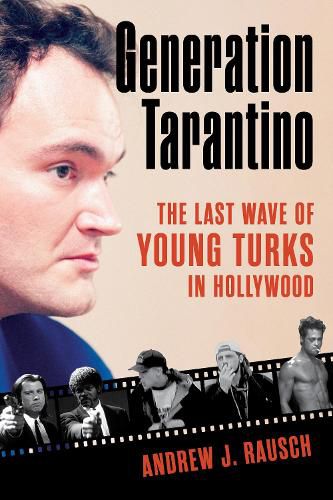Readings Newsletter
Become a Readings Member to make your shopping experience even easier.
Sign in or sign up for free!
You’re not far away from qualifying for FREE standard shipping within Australia
You’ve qualified for FREE standard shipping within Australia
The cart is loading…






In the wake of Tarantino's huge success with Reservoir Dogs (1992) and Pulp Fiction (1994), there was a wave of change in Hollywood beginning in the 1990s that continues today. Not since the "New Hollywood" generation of the 1970s had there been such a wave of new talent taking over Hollywood. Tarantino's acclaimed use of pop culture-referencing dialogue, non-linear story structure, stylized violence, literary devices, etc. could be seen in many movies that followed. While not every filmmaker in "Generation Tarantino" utilized stylistic elements from Tarantino's films, their careers were directly affected by his success. These filmmakers include such notable names as Roger Avary (Killing Zoe, 1993), Richard Linklater (Dazed and Confused, 1993), Robert Rodriguez (Desperado, 1995), David Fincher (Seven, 1995), Doug Liman (Swingers, 1996), Paul Thomas Anderson (Boogie Nights, 1997), Wes Anderson (Rushmore, 1998), Spike Jonez (Being John Malkovich, 1999), David O. Russell (Three Kings, 1999), and more. Some of these helmers already had an "in" into the business, but Tarantino's success suddenly made them sought-after hot commodities by studio execs searching for "hip, new, fresh" filmmakers. Not only did Tarantino's success change the course of Hollywood and help usher in a new wave of directors, but he became the de facto face of this generation of young filmmakers.
In addition to the "Tarantino Effect" changing the types of filmmakers studios were seeking, qthe way they were marketed, and influencing the filmmakers themselves, there were a slew of Tarantino knockoffs directly imitating his signature style. This copying was (and continues to be, although to a lesser extent) so rampant that the Oxford Dictionary officially recognized the word "Tarantinoesque" in 2018, defining it as movies that are "typically characterized by graphic and stylized violence, non-linear storylines, cineliterate references, satirical themes, and sharp dialogue."
$9.00 standard shipping within Australia
FREE standard shipping within Australia for orders over $100.00
Express & International shipping calculated at checkout
In the wake of Tarantino's huge success with Reservoir Dogs (1992) and Pulp Fiction (1994), there was a wave of change in Hollywood beginning in the 1990s that continues today. Not since the "New Hollywood" generation of the 1970s had there been such a wave of new talent taking over Hollywood. Tarantino's acclaimed use of pop culture-referencing dialogue, non-linear story structure, stylized violence, literary devices, etc. could be seen in many movies that followed. While not every filmmaker in "Generation Tarantino" utilized stylistic elements from Tarantino's films, their careers were directly affected by his success. These filmmakers include such notable names as Roger Avary (Killing Zoe, 1993), Richard Linklater (Dazed and Confused, 1993), Robert Rodriguez (Desperado, 1995), David Fincher (Seven, 1995), Doug Liman (Swingers, 1996), Paul Thomas Anderson (Boogie Nights, 1997), Wes Anderson (Rushmore, 1998), Spike Jonez (Being John Malkovich, 1999), David O. Russell (Three Kings, 1999), and more. Some of these helmers already had an "in" into the business, but Tarantino's success suddenly made them sought-after hot commodities by studio execs searching for "hip, new, fresh" filmmakers. Not only did Tarantino's success change the course of Hollywood and help usher in a new wave of directors, but he became the de facto face of this generation of young filmmakers.
In addition to the "Tarantino Effect" changing the types of filmmakers studios were seeking, qthe way they were marketed, and influencing the filmmakers themselves, there were a slew of Tarantino knockoffs directly imitating his signature style. This copying was (and continues to be, although to a lesser extent) so rampant that the Oxford Dictionary officially recognized the word "Tarantinoesque" in 2018, defining it as movies that are "typically characterized by graphic and stylized violence, non-linear storylines, cineliterate references, satirical themes, and sharp dialogue."